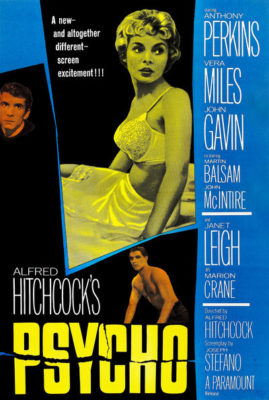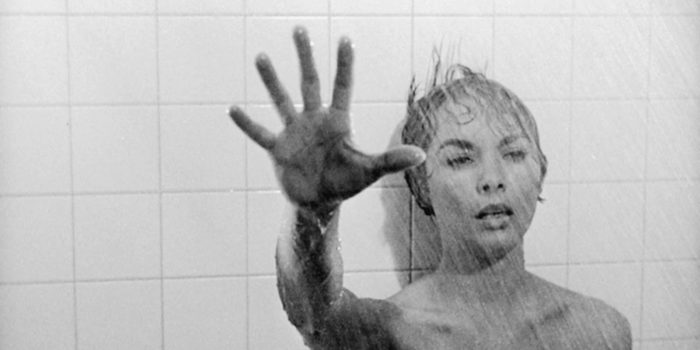
Directed by Alfred Hitchcock
Screenplay by Joseph Stefano
Starring Anthony Perkins, Vera Miles, Martin Balsam, John Gavin
I think everyone knows the story of Psycho; Marion, a stunningly attractive woman working as a secretary, decides to steal money from her boss so she can run away and start a new life with her boyfriend in another state. However, while travelling to meet him she stops at a motel for the night. The motel is owned by Norman Bates, an odd yet sweet man who lives with his elderly mother. Something is not quite right about their relationship, and what ensues is one of the most iconic and sinister creepfests ever made.
For me, it is the perfect horror movie – until the penultimate scene, of course, during which a doctor character clumsily points out the subtle nuances of the plot, thus destroying all of the understated elements of the script. Still, until that point it’s the perfect horror movie.
There’s no need for me to review Psycho, really, we all know how good it is. It’s always placed at the top of lists for the best horror movies of all time, and even if you haven’t seen the movie you’ll know the soundtrack and the famous shower scene. But why is it still so horrifying? How does it still resonate with audiences almost 60 years later?
It’s simple: the horrifying events in the movie occur at random. Norman Bates meets Marion without any premeditation, suggesting this sort of thing could happen to absolutely anyone.
A large portion of the movie is used to reveal the secretive life of an ambitious woman who wants more out of life but makes unwise decisions to get it. Marion is independent and intelligent, yet everything she does is governed by men. She wants to push against it but lacks the resources, hence the theft. She wants to get away and prove herself in order to live her dream life, but in doing so she gets caught up in a situation that is both unforeseeable and unprovoked. She stays at the Bates Motel completely by chance, and the horrors that unfold are unexpected and unconnected to her story up until then.
Modern horrors want everything to tie up neatly together. Everything is obvious and over-explained. There is no subtlety. Don’t get me wrong, Psycho also makes this mistake in the penultimate scene of the movie, but until that point things just seem to happen to an undeserving victim, which makes it all the more horrific to witness.
I’m not sure whether modern audiences are calling for simpler plots or if Hollywood is just underestimating them, but there have been so many movies in the last ten years that prove too much rationalisation kills horror. Flatliners is probably the most recent example of this.
Fear is created from the unknown. We live in an age in which we have to see and know everything to be satisfied, but it’s vitally important we’re not given what we want when it comes to this genre. After all, what’s more frightening than the unexpected?




Leave a Reply